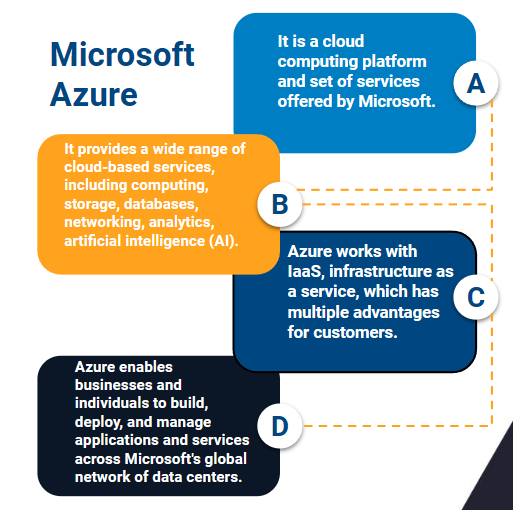Towards the secure cloud with Microsoft Azure
October 09, 2023
Table of contents
Quick Access
During the annual Rootstack event on September 21 in Panama, one of the talks that caused the greatest interest among our guests was the one offered by Microsoft, our partner, where everything about Azure and its functions for cloud computing was discussed.
Microsoft Azure, commonly known as Azure, is a cloud computing platform and set of services offered by Microsoft. It provides a wide range of cloud-based services, including computing, storage, databases, networking, analytics, artificial intelligence (AI), Internet of Things (IoT), and more. Azure enables businesses and individuals to build, deploy, and manage applications and services across Microsoft's global network of data centers.
Microsoft Azure and its Infrastructure as a Service
Joaquín Padilla, Presales Engineer at Microsoft, was in charge of explaining to our guests all the functions and benefits that Microsoft Azure has for business projects. Azure works with IaaS, infrastructure as a service, which has multiple advantages for customers:
- Low cost: Fixed monthly payments per usage to reduce risks.
- Elasticity: Pay only for what you use.
- Security: Data is always safe.
- Innovation: You have access to the latest technology.
- High availability: Services always available.
- Information Safeguarding: Minimizes risks due to natural disasters or theft within the organization.

Key components of Microsoft Azure
Key features and components of Microsoft Azure include:
- Virtual Machines (VMs): Azure allows users to create and manage virtual machines running Windows or Linux. This is often used to host cloud applications and services.
- Azure App Service: A platform for building, deploying, and scaling web applications and APIs, supporting multiple programming languages and frameworks.
- Azure Storage: Provides scalable and secure cloud storage options, including blob storage, file storage, and table storage.
- Azure SQL Database: A fully managed relational database service that allows you to configure, operate, and scale relational databases in the cloud.
- Azure Kubernetes Service (AKS): A managed container orchestration service based on Kubernetes, which simplifies the deployment, management, and scaling of containerized applications.
- Azure Functions: A serverless computing service that allows you to run code in response to events without the need to manage server infrastructure.
- Azure Active Directory: A cloud-based identity and access management service that helps secure and manage user identities and access to resources.
- Azure AI and Machine Learning: Azure offers several AI and machine learning services, including Azure Machine Learning, Azure Cognitive Services, and Azure Databricks for data analytics and AI-based applications.
- Azure IoT: Provides tools and services to build and manage IoT solutions, allowing devices to connect to the cloud and collect data for analysis.
- Azure Networking: Offers a variety of networking services including virtual networks, load balancers, VPN Gateway, and Azure ExpressRoute to connect to Azure securely.
- Azure DevOps: A set of development tools and services for continuous integration and delivery (CI/CD), project management, and collaboration.
- Azure Security Center: A unified security management system that provides advanced threat protection across all Azure workloads.

Microsoft Defender and its benefits for business projects
Another of the technologies that Microsoft touched on in its talk was Defender, a tool focused on safeguarding the data and processes of any software product. Microsoft Defender is a family of security products and services developed by Microsoft to help protect computers, devices, and data from various types of threats and malicious activities. It encompasses several security solutions, each designed to address specific aspects of cybersecurity.
Among its most important components are:
- Microsoft Defender Antivirus (formerly Windows Defender Antivirus): This is the built-in antivirus software that comes preinstalled with Windows operating systems. It is designed to detect, block and remove viruses, malware, spyware and other malicious software from a computer. It provides real-time protection and can automatically update your virus definitions to stay up to date with the latest threats.
- Microsoft Defender SmartScreen: This component helps protect against phishing attacks and malicious websites by analyzing URLs and websites to determine their security. Warns users if they try to visit a known malicious site.
- Microsoft Defender Firewall: It is a network firewall that comes with Windows and helps control incoming and outgoing network traffic to protect your computer from unauthorized access and potentially harmful network activities.
- Microsoft Defender Advanced Threat Protection (ATP): This is an enterprise-grade security solution that provides advanced threat protection, endpoint detection and response (EDR), and security analytics. It is designed to help organizations identify, investigate and respond to advanced and targeted attacks.
- Microsoft Defender for Identity (formerly Azure Advanced Threat Protection): This component is part of Microsoft's Azure security offerings and focuses on protecting against identity-based attacks and threats within an organization's network.
Microsoft continues to innovate in technological matters and at Rootstack we are proud to have them as one of our strategic partners, working hand in hand on various projects for our clients around the world.
We recommend you on video
Related Blogs

We were at MoveOn 2024! Rootstack sponsored one of the most important tech events in Panama
Vue.js or React for frontend development?


How to integrate UiPath RPA with a database

